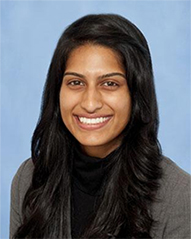UMMS’ new Global Surgery course emphasizes research-methods instruction, combined with faculty mentorship and field experience, in order to give students the academic foundation to conduct surgery-focused academic research in low- to middle income countries. It was created by surgical resident Kavitha Ranganathan, MD, to help students interested in both surgery and global health navigate their early academic careers.

“Avenues to pursue global health in surgery have not been well defined,” Ranganathan said. “I didn’t really figure out how to combine my two passions – surgery and global health – until residency. So I wanted to make it easier for students to figure out early that this can be a career, and thus have a better chance to make an impact.”
Through a series of formal and informal sessions, students will have the opportunity to define the state of global surgery initiatives in low- and middle-income countries, designing and initiating a study focused on improving access to surgical care internationally, in the process broadening their understanding of diverse cultures and healthcare systems. The course’s introduction coincides with the recent launch of the Michigan Center for Global Surgery and reflects new efforts to create opportunities for medical students and surgery faculty alike to engage in global health work and, in particular, research.

“Our emphasis on global health within the Department of Surgery is rapidly expanding with an eye toward advancing scholarly work in this area,” said Professor of Surgery Krishnan Raghavendran, director of the new Center for the Global Surgery. “This new course is a perfect complement to those efforts because it allows us to engage synergistically across all learners, from students to post-graduates and faculty.”
The elective course also marks the first global health-specific offering under the redesigned trunk/branches UMMS curriculum, said Professor of Surgery Michael Englesbe, MD, who is also director of the third- and fourth-year medical school curriculum (i.e., the branches).
“I think this new course is a first and hopefully won’t be the last, given the strong interest from a lot of our medical students in global health. Students are thirsty for opportunities to impact the world,” Englesbe said. “Under the new curriculum design, the branches are perfect time for senior medical students who already understand clinical services pretty well to explore how their practice could be applied beyond the United States.”
Historically, global health efforts have been dominated by fields like internal medicine, to combat communicable diseases, or Ob-Gyn, to address infant mortality. But advances in those and other areas, combined with epidemiological shifts toward chronic conditions and non-communicable diseases, mean an increased need for a multi-disciplinary approach to global health, opening the field to departments like Emergency Medicine and Surgery.
“A decade or two ago, people were dying of diseases like HIV and TB. As those deaths have decreased over time, people are surviving longer, which leads to an increased need for other kinds of care, whether that means treating mental illness, chronic conditions, or trauma and burns,” said Ranganathan. “Because of that shift, people who previously might have had a difficult time pursuing global surgery as an academic career now can, so the goal of the course is really to show students how they can begin building a career on these types of initiatives.”
Ranganathan, who has done previous global health work in Ghana, India and Colombia, pulled together stakeholders from various disciplines – business, medicine, public health – to build a comprehensive course. It was piloted in the spring to two medical students and is open this fall for general registration for the first time.
“Kavitha is someone who has found global health to be invigorating and inspirational in her career. She really took it upon herself to develop the infrastructure to create similar opportunities for other people through this new course,” Englesbe said. “I think it’s a remarkable course and she’s a remarkable leader.”
